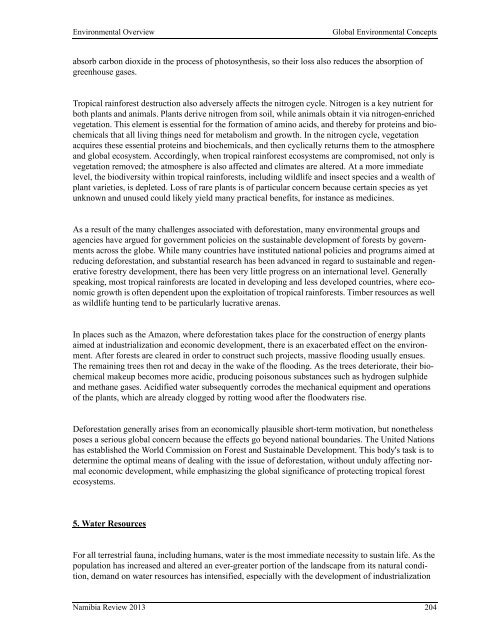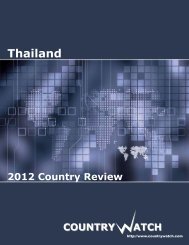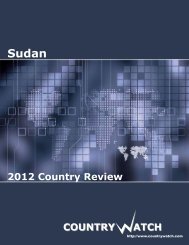Namibia - CountryWatch
Namibia - CountryWatch
Namibia - CountryWatch
You also want an ePaper? Increase the reach of your titles
YUMPU automatically turns print PDFs into web optimized ePapers that Google loves.
Environmental Overview Global Environmental Concepts<br />
absorb carbon dioxide in the process of photosynthesis, so their loss also reduces the absorption of<br />
greenhouse gases.<br />
Tropical rainforest destruction also adversely affects the nitrogen cycle. Nitrogen is a key nutrient for<br />
both plants and animals. Plants derive nitrogen from soil, while animals obtain it via nitrogen-enriched<br />
vegetation. This element is essential for the formation of amino acids, and thereby for proteins and biochemicals<br />
that all living things need for metabolism and growth. In the nitrogen cycle, vegetation<br />
acquires these essential proteins and biochemicals, and then cyclically returns them to the atmosphere<br />
and global ecosystem. Accordingly, when tropical rainforest ecosystems are compromised, not only is<br />
vegetation removed; the atmosphere is also affected and climates are altered. At a more immediate<br />
level, the biodiversity within tropical rainforests, including wildlife and insect species and a wealth of<br />
plant varieties, is depleted. Loss of rare plants is of particular concern because certain species as yet<br />
unknown and unused could likely yield many practical benefits, for instance as medicines.<br />
As a result of the many challenges associated with deforestation, many environmental groups and<br />
agencies have argued for government policies on the sustainable development of forests by governments<br />
across the globe. While many countries have instituted national policies and programs aimed at<br />
reducing deforestation, and substantial research has been advanced in regard to sustainable and regenerative<br />
forestry development, there has been very little progress on an international level. Generally<br />
speaking, most tropical rainforests are located in developing and less developed countries, where economic<br />
growth is often dependent upon the exploitation of tropical rainforests. Timber resources as well<br />
as wildlife hunting tend to be particularly lucrative arenas.<br />
In places such as the Amazon, where deforestation takes place for the construction of energy plants<br />
aimed at industrialization and economic development, there is an exacerbated effect on the environment.<br />
After forests are cleared in order to construct such projects, massive flooding usually ensues.<br />
The remaining trees then rot and decay in the wake of the flooding. As the trees deteriorate, their biochemical<br />
makeup becomes more acidic, producing poisonous substances such as hydrogen sulphide<br />
and methane gases. Acidified water subsequently corrodes the mechanical equipment and operations<br />
of the plants, which are already clogged by rotting wood after the floodwaters rise.<br />
Deforestation generally arises from an economically plausible short-term motivation, but nonetheless<br />
poses a serious global concern because the effects go beyond national boundaries. The United Nations<br />
has established the World Commission on Forest and Sustainable Development. This body's task is to<br />
determine the optimal means of dealing with the issue of deforestation, without unduly affecting normal<br />
economic development, while emphasizing the global significance of protecting tropical forest<br />
ecosystems.<br />
5. Water Resources<br />
For all terrestrial fauna, including humans, water is the most immediate necessity to sustain life. As the<br />
population has increased and altered an ever-greater portion of the landscape from its natural condition,<br />
demand on water resources has intensified, especially with the development of industrialization<br />
<strong>Namibia</strong> Review 2013 204




